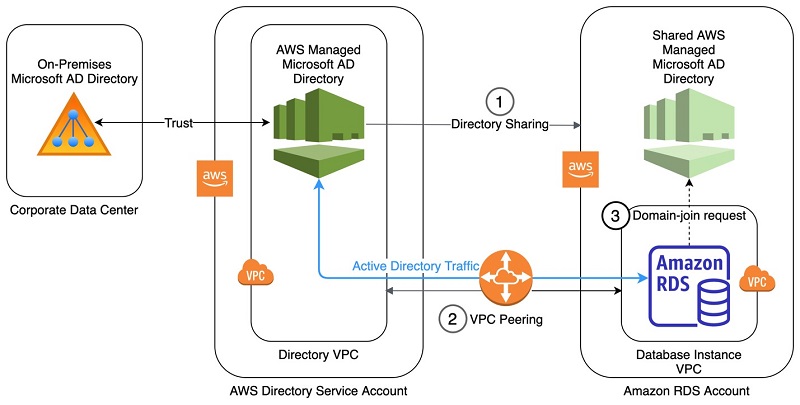AWS Database Blog
Tag: Amazon RDS
Migrating legacy PostgreSQL databases to Amazon RDS or Aurora PostgreSQL using Bucardo
If you are using PostgreSQL earlier than 9.4, you are using an unsupported version of PostgreSQL, and may have limited options to migrate or replicate your databases in Amazon RDS or Amazon Aurora PostgreSQL. This is primarily because PostgreSQL versions older than 9.4 can’t perform logical replication. Bucardo is an open-source utility that can replicate […]
Joining your Amazon RDS DB instances across accounts to a single shared domain
How can you simplify the setup and maintenance and reduce the costs of AWS Managed Microsoft AD directories, while also strengthen the security of your Amazon Relational Database Service (RDS) for SQL Server DB instances? AWS announced that you can now join your Amazon RDS for SQL Server DB instances deployed across multiple AWS accounts […]
Amazon RDS customers: Update your SSL/TLS certificates by March 5, 2020
This post was originally published on December 20, 2019 and has been updated as of March 4, 2020. Please see new dates and suggested timeline below. IMPORTANT UPDATE: If you are experiencing connectivity issues after the RDS Root CA expires, please skip down to the What do I have to do to maintain connectivity? section. […]
Disaster recovery on Amazon RDS for Oracle using AWS DMS
AWS Database Migration Service (AWS DMS) helps you migrate data from databases on-premises to Amazon Relational Database Service (RDS). You can also use it to migrate data between heterogeneous or homogeneous database engines, among other things. Businesses of all sizes use AWS to enable faster disaster recovery (DR) of their critical IT systems without having […]
Best practices for upgrading Amazon RDS to major and minor versions of PostgreSQL
This post was last reviewed and update June, 2022 to update the upgrade steps for Amazon RDS. Open-source PostgreSQL occasionally releases new minor and major versions that include fixes for frequently encountered bugs, security issues, and data corruption problems. Generally, Amazon RDS aims to support new engine versions within five months of their availability. You […]
Securing Amazon RDS and Aurora PostgreSQL database access with IAM authentication
AWS provides two managed PostgreSQL options: Amazon RDS for PostgreSQL and Amazon Aurora PostgreSQL. Both support IAM authentication for managing access to your database. You can associate database users with IAM users and roles to manage user access to all databases from a single location, which avoids issues caused by permissions being out of sync […]
Migrating databases using RDS PostgreSQL Transportable Databases
April 2023: This post was reviewed and updated with a new section on Limitations Amazon Relational Database Service (Amazon RDS) for PostgreSQL now supports the feature Transportable Databases, a high-speed data import and export method supported on versions 11.5 and later and 10.10 and later. If you need to import a PostgreSQL database from one […]
Implementing cross-region disaster recovery using Oracle GoldenGate for Amazon RDS for Oracle
Many AWS users take advantage of the managed service offerings available in the AWS portfolio to do the heavy lifting in their day-to-day activities. Amazon RDS is one of these services and is ideal for your relational database deployments. With RDS, you can significantly reduce the administrative overhead of managing and maintaining a relational database. […]
Dive into new functionality for PostgreSQL 11
In this post, I take a close look at three exciting features in PostgreSQL 11: partitioning, parallelism, and just-in-time (JIT) compilation. I explore the evolution of these features across multiple PostgreSQL versions. I also cover the benefits that PostgreSQL 11 offers, and show practical examples to point out how to adapt these features to your applications.
Working with RDS and Aurora PostgreSQL logs: Part 2
July 2023: This post was reviewed for accuracy. The first post in this series, Working with RDS and Aurora PostgreSQL Logs: Part 1, discussed the importance of PostgreSQL logs and how to tune various parameters to capture more database activity details. PostgreSQL logs provide useful information when troubleshooting database issues. This post focuses on different […]







